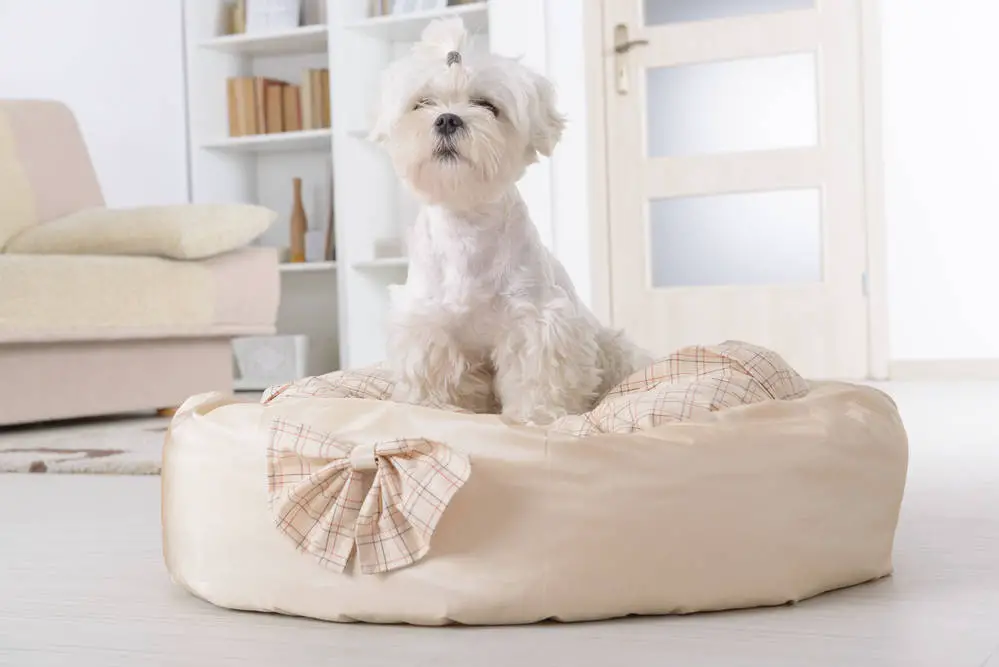
Maltese dogs are sprightly vigorous little balls of fluff. They excel at being great companions and are often recommended as therapy dogs. They are agile, obedient, and competitive.
Above all, Maltese dogs love to be surrounded by their family. They are an adorable breed that even newbie pet parents cannot help but give in to their charms.
- Can Maltese Dogs Be Left Alone?
- What Is Separation Anxiety?
- How To Leave Your Maltese Dog Home Alone And Ensure Their Safety
- Keep Them Distracted And Well Provided For
- How Long Can I Keep A Maltese Dog Alone For?
- How Long Can I Keep A Maltese Puppy Alone For?
- How Long Can I Keep A Senior Maltese Dog Alone For?
- Summing Up
Can Maltese Dogs Be Left Alone?
For any breed of dogs, being alone can be a harrowing experience. A Maltese dog can feel depressed and lonely due to their social predisposition. They are pack animals and are used to being around the company of their family.
To answer the question, yes, Maltese dogs can be left alone but only for a short time. If left for longer without proper precautions, they can develop separation anxiety.
What Is Separation Anxiety?
Dogs suffer from separation anxiety when they are separated from their families or guardians for long periods. They can get anxious, distressed, or, in some cases, showcase violent tendencies.
Maltese dogs can get extremely emotionally attached to their families. Due to this, they suffer from severe separation anxiety.
Related: Do Maltese Get Along With Other Dogs?
What Are The Common Signs Of Separation Anxiety In Dogs?
Maltese dog owners often fail to notice signs of separation anxiety on their puppies until they experience a lashing out.
The best time to keep an eye out for signs of distress is right before the guardian leaves or immediately after returning home. The signs include:
- Urination of defecation: Maltese dogs who suffer from separation anxiety tend to urinate or defecate when the guardian leaves or returns home. They do not do this when the guardian is around.
- Barking or growling: incessant barking or growling immediately after they are left alone.
- Chewing or destroying things: Guardians usually return home to find a trail of destruction left behind. Chewed furniture, shoes, random objects, or things littered everywhere.
- Pacing: Maltese dogs with anxiety would pace around when it is time for their guardian to leave.
- Coprophagia: A condition where a distressed Maltese would attempt to ingest their own feces.
If the above-mentioned signs are experienced by your pooch, it is best to seek help from a veterinarian. Many other illnesses are associated with the above symptoms. It is best to rule out the possibility of any illness present.
How To Leave Your Maltese Dog Home Alone And Ensure Their Safety
Being a Maltese owner, it is heartbreaking to see the little puppies suffering and distressed. Ensuring that your dog is safe and secure should be one of your top priorities when leaving them alone.
Training
- Training your Maltese to stay in a small area prevents them from reigning destruction on your entire house. This also provides them with a “safe zone,” diminishing their lonesome feelings.
- If they show signs of distress when you are leaving, avoid punishing them. Especially if they were destructive around the house. This will only give rise to more anxiety. Provide them with positive reinforcement instead.
- Make sure that your coming and going out ritual is not too dramatic. Be casual about it to avoid giving your pooch stress.
- You can get your Maltese to be used to the separation by leaving them alone for 10 to 15 minutes. As they get used to, gradually increase the time of separation.
Change Your Routine
When you change your schedule, it confuses your Maltese from detecting that you’re about to leave. For instance, you can head out only to come back immediately to eat your breakfast. Or pick up your car keys and watch TV.
Provide Ample Exercise
- A walk or exercise before leaving will tire out your furry best friend. If they are too tired, they won’t have the energy to destroy things. The exercise will make them take a nap and overall be less stressed.
- Additionally, exercise will keep them healthy and burn calories. Take them for a walk for about 20-30 minutes and play with them for a little while. This will not only keep them healthy but also strengthen your bond with them.
Keep Them Distracted And Well Provided For
- Whenever you are leaving your dog for long periods of time, ensure that they have all necessities around them. A small amount of water should be available to them in a bowl or cup. Place it in a way that your playful Maltese doesn’t tip it over easily.
- Leave them with a small amount of dog food, preferably soft, so they don’t choke on them. Maltese are not known to inhale their food, but it is better to be safe than sorry.
- You can also feed them before you leave to fill them up. This will make them feel sleepy and less anxious.
- Toys will keep them fascinated and busy for long. The best way to guarantee that they’ll be occupied is to get them to treat dispenser toys. That is bound to keep them engaged for a long time.
- Leave them with some of your worn clothes. It will help your Maltese to remain calm.
Seek Assistance
- The best way to warrant your doggo’s safety is to keep a vigilant watch over them. Using a wireless security camera allows you to keep an eye on them and prevent them from potential harm while they are alone.
- If your puppy is anxious despite your every effort, seek help from a neighbor or a friend who can check upon them. You can even hire a dog nanny for extra care and protection.
- Maltese dogs are highly sociable. If they aren’t doing well alone in the house, keep them in a dog day-care to play with other dogs. Make sure you do ample research on the day-care and let your companion get familiar with the place in your presence.
How Long Can I Keep A Maltese Dog Alone For?
Maltese dogs can be left alone for specific times, depending on their age. A Maltese puppy can be left alone for two hours until they are six months old.
An adult Maltese dog can be left on their own for more than eight hours, provided they have adequate food and water for them.
Related: Why Do Maltese Lick So Much?
How Long Can I Keep A Maltese Puppy Alone For?
Constant care and attention need to be showered on Maltese puppies younger than six months. They are not mature enough to fend for themselves and are extremely vulnerable.
Keeping them alone for too long would inevitably cause severe separation anxiety. At that tender age, they cannot be trained to be left alone for an extended period of time.
Having them unsupervised would not be recommended, as their tiny size can prove harmful. They can crawl into tight spaces and become stuck, suffocated, or lost. Puppies are also full of energy, so it’s unlikely that they’ll patiently wait for you.
How Long Can I Keep A Senior Maltese Dog Alone For?
A senior Maltese dog will undoubtedly be more trained than a tiny puppy. This, however, should not be of any excuse to leave them alone for a long time. They can be left without supervision for 6 to 8 hours.
A senior Maltese needs more supervision than an adult dog. They do not have considerable control over their bladder and may need to relieve themselves occasionally.
They might not be as energetic or playful as a young doggo, but they still need to be kept occupied with their favorite past times. Going on a short walk with them and playing with them before leaving would go a long way towards keeping your friend less anxious.
Give them wet dog food to eat since they might not be able to chew dry food. Give them a soft chew toy that they can play with without damaging their teeth or gums.
Summing Up
Separation anxiety is common in Maltese dogs. Your pup suffers from it as a result of emotional attachment to you. The anxiety generally evokes destructive tendencies and depression in the dogs when left alone.
Since it is a behavioral problem, the way to go about it is with patience, counter conditioning, and desensitizing. It helps relax your dog into associating the separation with something positive.

